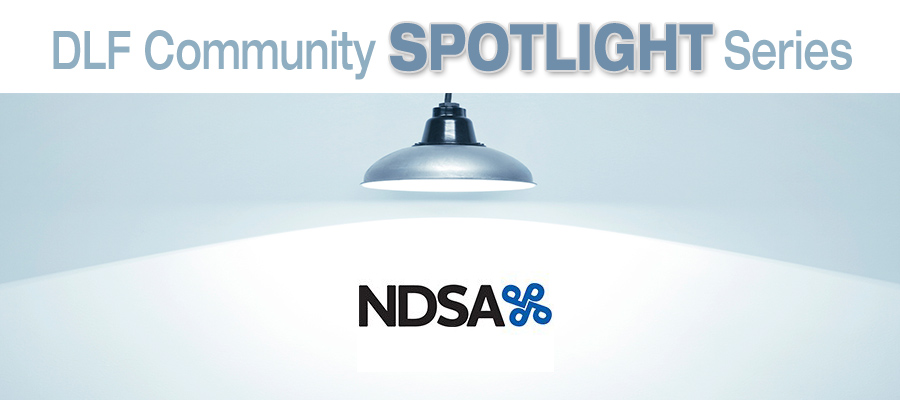
This Community Spotlight was provided by Butch Lazorchak, Digital Archivist, National Digital Information Infrastructure and Preservation Program, Library of Congress.
UPDATE, October 2015: Digital Library Federation Becomes New Institutional Host for the NDSA, effective 1 January 2016! See our press release.
The Committee on Coherence at Scale looks to foster strategic thinking about managing the transition from analog to digital in higher education. A key challenge is exploring how large-scale, multi-partner projects can enhance the richness of scholarly productivity in the digital environment. The National Digital Stewardship Alliance is a great example of this type of project in practice.
The NDSA, a no-cost, volunteer-driven initiative of the National Digital Information Infrastructure and Preservation Program based in the Library of Congress, was launched in July 2010 but really got going with the organizing workshop held December 15-16, 2010 in Washington, D.C. The workshop brought interested digital preservation and stewardship community members together to enact the NDSA’s mission “to establish, maintain and advance the capacity to preserve our nation’s digital resources for the benefit of present and future generations.”
Organizations are increasingly taking a digital stewardship approach to the management of the creation, description, curation, accessibility and preservation of digital information objects over the entire lifecycle. The NDSA is the only national organization specifically dedicated to digital stewardship that also welcomes member organizations from across the information management spectrum from academia, all levels of government and the private sector.
A key challenge for the community is that digital stewardship practice is subject to continual reevaluation due to the rapid pace of technology development, but the availability of resources and technical expertise is static and even diminished in an era of tightening budgets.
Thus, the NDSA was designed to provide a platform for information-sharing and community identification of activities that also leverages common organizational interests and energies to develop best practice approaches to managing digital information for the long-term.
The NDSA organizational structure allows it to flexibly adapt to change through the establishment of 5 independent working groups with a guiding coordinating committee.
The coordinating committee provides overall strategic guidance for the NDSA. A key deliverable of the coordinating committee is the National Agenda for Digital Stewardship. The Agenda integrates the perspective of NDSA experts to provide funders and executive decision-makers insight into emerging technological trends, gaps in digital stewardship capacity and key areas for funding, research and development to ensure that today’s valuable digital content remains accessible and comprehensible in the future.
The “2014 National Agenda for Digital Stewardship” was released in conjunction with the Digital Preservation 2013 meeting and has had an significant impact on digital stewardship practice. The coordinating committee is currently at work on the next iteration of the National Agenda, to be released in conjunction with the Digital Preservation 2014 meeting in July.
The working groups self-organize and the outputs of each group are driven by the interest of the participating members. Some highlights:
- The Content working group released its first Web Archiving survey in 2012, with the second underway. The Geospatial Content subgroup released the “Issues in the Appraisal and Selection of Geospatial Data” report (pdf) in late 2013.
- The Infrastructure working group released the results from the first Preservation Storage survey and is currently working on a follow-up.
- The Innovation working group coordinated two sets of NDSA Innovation award winners, recognizing “Individual,” “Project,” “Institution” and “Future steward” categories of superior work in digital stewardship.
- The Outreach group released the Digital Preservation in a Box set of resources that provide a gentle introduction to digital stewardship concepts.
- The Standards and Practices working group released the “Staffing for Effective Digital Preservation” (pdf) and the “Benefits and Risks of the PDF/A-3 File Format for Archival Institutions” (pdf) reports.
The NDSA also works to promote the value of digital preservation and stewardship work at the national level by highlighting impressive efforts through an expanding series of webinars and the Insights and Content Matters interview series on the Signal blog.
Over the coming year the NDSA is working to expand its interpersonal outreach activities through broad representation at library, archive and museum conferences and by engaging with partners such as the POWRR project in a series of regional meetings that will help build digital stewardship capacity at the local level.
There are no membership fees to join the NDSA. Its organizational structure provides a real opportunity for organizations, large, medium or small, to have a significant voice in developing digital stewardship practice. There are many other benefits to membership, so get in touch to help make the future happen today.

